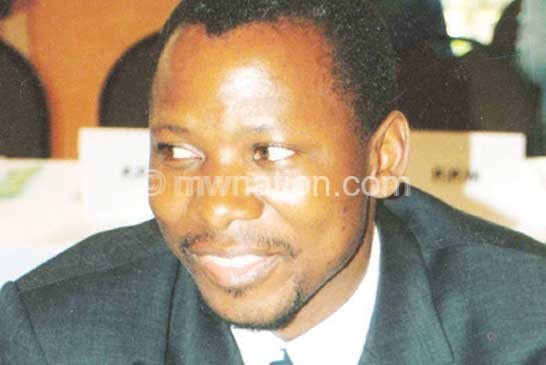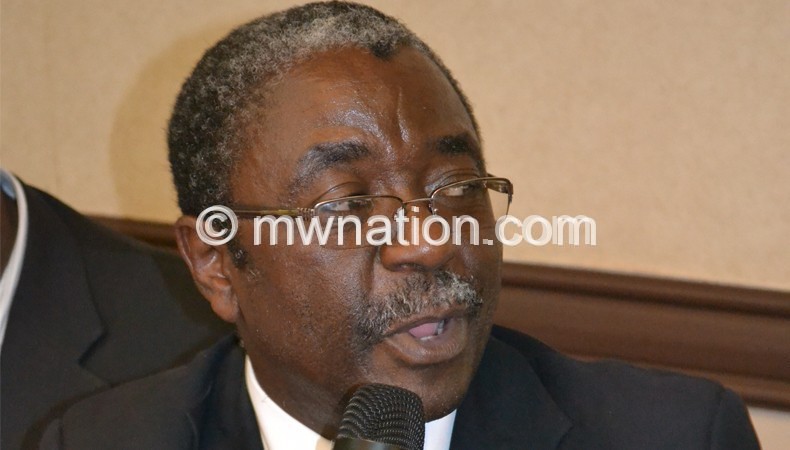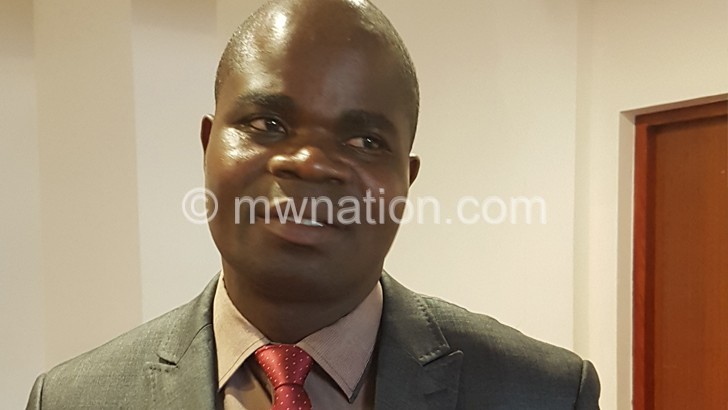Questions over AG party role
Opposition political parties and legal experts have questioned the Attorney General (AG) Charles Mhango’s active involvement in mainstream politics, where he doubles as legal adviser for the ruling Democratic Progressive Party (DPP).
They say this compromises the office, which is constitutionally mandated to be the principal legal adviser to government.

But the DPP has maintained that there is no conflict of interest in having the AG double as legal adviser for the ruling party, adding that the office holder separates state functions from partisan interests.
The Malawi Constitution, in Section 98(1) considers the Attorney General as the ‘principal legal adviser to government’ responsible for advising the Government on all legal matters and conducts civil litigation for and on behalf of the Government.
In an interview with Nation on Sunday, chairperson for the Parliamentary Committee on Legal Affairs Maxwell Thyolera said his committee has developed a report to be tabled in Parliament, which recommends that the Legislature should have its own attorney following loss of confidence in the office of the AG. According to Thyolera, the report followed a private motion, in a 2016 sitting of Parliament, from Ntchisi North legislator, Boniface Kadzamira, which proposed the autonomy of parliament.
“We want Parliament to be independent financially, institutionally and administratively; and we think in so doing we have to get rid of the Attorney General as an adviser of Parliament. Of course, this means we have to amend the law. And this is our recommendation in the report,” said Thyolera.
Aford president and member of Parliament (MP) for Rumphi Central Enoch Chakufwa Chihana also wonders how the AG can fairly provide legal advice to opposition political parties and members in the national assembly when he is an adviser to another ruling party. Chihana fears that the advice given to parliamentarians who are not DPP may be influenced by party colours.
The Aford leader stressed that while the law allows the president to appoint the Chief Legal Advisor who can be a politician in the case of ministers of Justice who have doubled as AG—such a situation undermined the important role of the office.

“Do you expect me to get fair assistance from the Attorney General, who is not just a principal advisor to the ruling party but also an aspiring candidate in my constituency? He is an interested party and any advice that would be given to me would be skewed towards this obvious political interest. The office is supposed to benefit government as whole,” said Chihana.
Secretary General for the main opposition party—MCP Gustave Kaliwo, who is also a lawyer, agrees with calls to change the law to have someone without clear and perceived political affiliation to hold the office of the AG for them to work impartially.
“Much as I have a lot of respect for Mr. Charles Mhango, we are talking of the office and not the individual and when we are talking of the office, definitely the Malawi Congress Party doesn’t want to get legal advice from the legal advisor of the DPP. No matter how independent he maybe, we will have problems with that and I am sure that this is the feeling of other political parties as well. That is not to undermine the president’s prerogative to appoint the attorney general but if he wants to inspire confidence in that office then we need someone who is not typically a politician with a clear affiliation to a party,” said Kaliwo.

In telephone interviews, both the DPP and Mhango played down the fears, stressing that there is no conflict of interest and until the law is changed, the AG is free to associate with the ruling party.
DPP spokesperson Francis Kasaila said he believes that the AG is professional enough to differentiate his two roles—as legal adviser to government and the party. Kasaila, however, said those calling for the independence of the office have a right to do so and theirs is ‘a listening’ government.
In a separate interview, Mhango said he is not the first one to be in that position while still active in mainstream politics, saying the law permits such a situation. He said the argument against him would only be justifiable in a case where someone can prove that he has not provided fair advice say to Parliament or members of the House because of his affiliation to the DPP.
“In my scenario, the political party I am giving advice to is a ruling party; therefore, I do not see any conflict of interest. However, in my advice as Charles Mhango, I do not show my party colours because I advise the Speaker, I advise the Chief Justice and I advise all the three arms of government. I don’t, in my work, demonstrate any party colours,” he said.
Put to him that Parliament is agitating to have its own attorney for purposes of independence, Mhango said: “I do not agree at the moment because, one the clerks in Parliament is ordinarily a lawyer and is the one who gives initial advice at Parliament level. She is supported by a team of lawyers there and at the moment there are so many lawyers who are working with Parliament, who are not attached to the office of the AG who only comes in as the last resort, should things not work.”
Mhango said he has provided advice to Parliament, including representing some legislators who are not members of the ruling party, citing the recent case involving Nsanje South West MP Joseph Chidanti-Malunga.
Section 98 of the Constitution, which establishes the office of the AG puts it clear that the office may either be the office of the minister or maybe a public office. Where it is the office of the minister—someone actively affiliated to a political party can be appointed to the office and where it is a public office usually someone without
political colours holds the office. It is this provision of the law which has allowed some ministers of Justice to double as AG.
Commenting on the issue, private practice lawyer Justin Dzonzi shares fears that the AG’s affiliation to the ruling party undermines his role as a principal legal adviser to government.
According to Dzonzi, the ruling party may not always have the interest of government. He also agreed with the intention of Parliament to have its own attorney.
“The ruling party sometimes may have interests that do not benefit government (well-being of the people) so how does the AG balance the act; the interest of the party and that of government as a whole. We have had cases were two branches of government are in conflict for example when judges were demanding an improvement in their condition of service and the executive was reluctant to do so— you could see the AG siding with the interest of the executive. The same thing with parliament, so I see a conflict of interest,” he said.
But constitutional law expert at Chancellor College professor Edge Kanyongolo said there is nothing unusual in having an AG who is linked to a political party, saying the tradition was widespread in most countries. Kanyongolo said what suffers is simply the perception that people have of the office.
“It happens even in the US. There is nothing wrong about it. What may be a problem is how people perceive such an office and indeed perception must not be taken for granted. But I believe what is important is the conduct of the office holder—they must be professional all the time,” said Kanyongolo.






Question is…is he drawing two salaries for doing these two jobs or is he just being used by DPP?
If he is getting two salaries that might be an issue on its own becoz as an AG for the govt he is a civil servant by definition and not supposed to have two jobs at the same time.